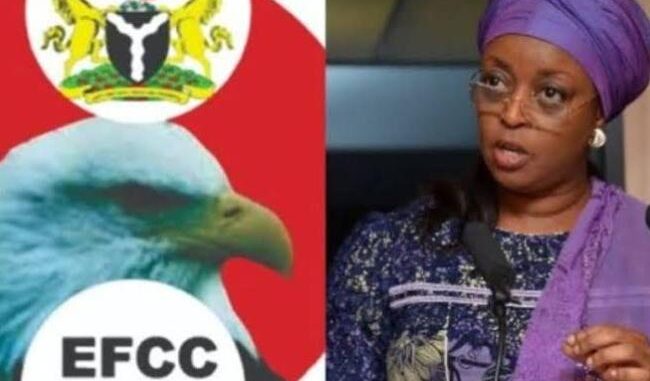
She argued that the orders were issued without jurisdiction and violated her right to a fair hearing, as enshrined in Section 36(1) of the 1999 Constitution.
A Federal High Court in Abuja on Monday granted an application by former Minister of Petroleum, Diezani Alison-Madueke, to amend her suit challenging the Economic and Financial Crimes Commission’s (EFCC) final forfeiture order on her seized assets.
Justice Inyang Ekwo approved the request after Diezani’s lawyer, Godwin Inyinbor, moved the motion, which EFCC counsel Divine Oguru did not oppose.
During the hearing, Inyinbor informed the court that they had already filed a motion to amend their originating process and duly served the defendant.
Justice Ekwo granted the motion as prayed, giving the former minister five days to file and serve the amended processes, while the EFCC was given 14 days to respond. The case was then adjourned to March 17 for further mention.
The former minister, through her counsel Chief Mike Ozekhome, SAN, had sued the EFCC as the sole respondent, challenging the public sale of her forfeited properties.
She argued that the orders were issued without jurisdiction and violated her right to a fair hearing, as enshrined in Section 36(1) of the 1999 Constitution.
Justice Ekwo had initially set November 21, 2024, for hearing the motion to amend the suit before granting the request on Monday.
The News Agency of Nigeria reports that the former minister argued she was never served with a charge sheet, proof of evidence, or any summons related to the criminal charges against her in court.
She also claimed that the courts were misled into issuing several final forfeiture orders against her assets due to the suppression or non-disclosure of key information.
“The applications that led to the final forfeiture orders were based on serious misstatements, misrepresentations, and concealment of material facts,” she stated.
She further argued that the court has the power to overturn such orders, as a void ruling is legally considered as if it was never made.
“The orders were issued without considering my constitutional rights to a fair hearing and to own property. I was never served with court processes in any of the proceedings that resulted in the forfeiture order,” she added.
In response, the EFCC urged the court to dismiss her application.
In a counter-affidavit, EFCC detective Rufai Zaki stated that investigations had clearly implicated the ex-minister in criminal activities, including conspiracy, official corruption, and money laundering.
He noted that she was charged in case numbered FHC/ABJ/CR/208/2018, filed before the Federal High Court in Abuja on November 14, 2018.
“We rely on this charge, as documented in Exhibit C of the applicant’s affidavit,” Zaki said.
He dismissed her claims as untrue, stating that the cases leading to the asset forfeiture were “actions in rem”—legal actions against the property itself rather than a specific person.
He explained that the court had ordered public notices in newspapers, inviting interested parties to challenge the forfeiture before final orders were made.
Zaki also revealed that a lawyer, Nnamdi Awa Kalu, represented the ex-minister in at least one forfeiture application.
Referring to a judgment by Justice I.L.N. Oweibo on September 10, 2019, he said the final forfeiture of the assets was ordered in 2017 and had not been overturned on appeal.
The properties, he added, have since been legally disposed of.
The EFCC had previously announced a public auction of all assets seized as proceeds of crime, including properties linked to the ex-minister. The auction began on January 9, 2023.
The commission’s suspended chairman, Abdulrasheed Bawa, had disclosed that $153 million and over 80 properties were recovered from the former minister.
She is alleged to have fled to the United Kingdom after leaving office as petroleum minister, a position she held from 2010 to 2015 under former President Goodluck Jonathan.
Meanwhile, the asset-related case is separate from another lawsuit she filed, in which she seeks N100 billion in damages over what she claims are defamatory publications by the EFCC.
Leave a Reply